Mobs are standing by, at-the-ready, to be stoked in large part by Team Crump’s response to the upcoming verdict…
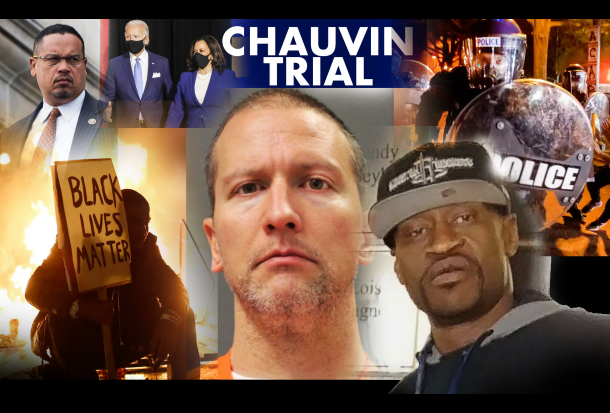
Follow our coverage of the trial and watch inside the courtroom at Chauvin Trial LIVE blog.
(MINNEAPOLIS, MN) – Closing arguments in State of Minnesota vs. Derek Chauvin begin on Monday morning, after three weeks of witness testimony and cross-examination. As expected, medical evidence explaining the cause of George Floyd’s death was the main focus of both cases presented to the jury.
Jurors will hear closing arguments from state prosecutors and Chauvin’s defense, and then will immediately begin deliberations and be sequestered until they can decide on the charges applying the instructions given to them by the court.
Judge Peter Cahill told jurors on Thursday shortly after both sides rested their case, ‘pack a bag for long, but hope for a short deliberation.’
The jury could find Chauvin guilty of some of the charges, but acquit him of the others. Or, he could be found guilty or acquitted of all the charges.
Many legal scholars, including famed criminal lawyer Alan Dershowitz have from day one talked about the state’s ‘over-charging’ problem in the Chauvin case. What effect will this potential misstep mean for the outcome of this trial when the jury begins deliberation and ultimately renders its verdict?
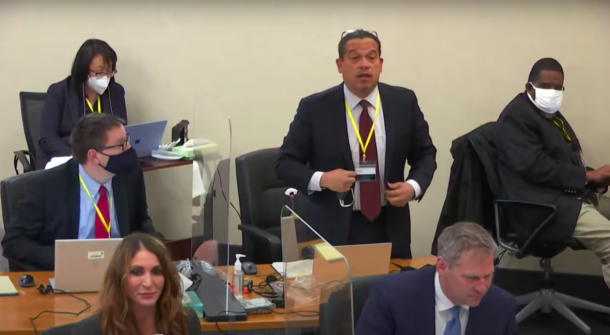
IMAGE: Minnesota Attorney General Keith Ellison (pictured above standing), the state’s top cop, pushed hard to get the 3rd degree murder charge re-instated and also promised back in June of 2020 to ‘get justice’ for George Floyd.
Here are the charges against Chauvin and their applicable criminal statutes that the jury must decide on:
- 2nd degree unintentional murder while committing a felony
- 3rd degree felony assault
- 3rd degree murder
- 2nd degree manslaughter
For the 2nd degree murder charge to stick, jurors will need to also decide on the 3rd degree felony assault charge, as the charges are linked:

IMAGE: Relevant section of 2nd degree murder statute – Subd.2. (Source: State of Minnesota)
![]()
IMAGE: Relevant section of 3rd degree assault statute – Subd.1. (Source: State of Minnesota)
While these charges against Chauvin do not explicitly have ‘intent’ attached to them, throughout the trial the state has inferred it numerous times – calling multiple ’emotionally harmed’ bystander witnesses, use-of-force experts, and even members of the Minneapolis Police Department, including Chief Medaria Arradondo, to testify that Chauvin’s restraint of George Floyd could have been shortened, but he chose to prolong it.
This could persuade some jurors to let their pre-conceived ‘motivations be the master of their reason’ – as referenced here by constitutional attorney Robert Barnes – instead of following the jury instructions and the law as given to them:
This is how jurors tend to operate: they pre-filter a witness’ testimony according to their pre-ordained conclusions of guilt or innocence. Motivation is the master of reason; reason is not the master of motivation. https://t.co/sJRdzc1YkK
— Robert Barnes (@barnes_law) April 14, 2021
The state must still prove to the jury beyond a reasonable doubt that Chauvin caused Floyd’s death while committing a 3rd degree felony assault, inflicting “substantial bodily harm.”
Many trial watchers lauded the state’s ‘star’ medical witness, Dr. Martin Tobin, a pulmonologist and critical care specialist based in Illinois.
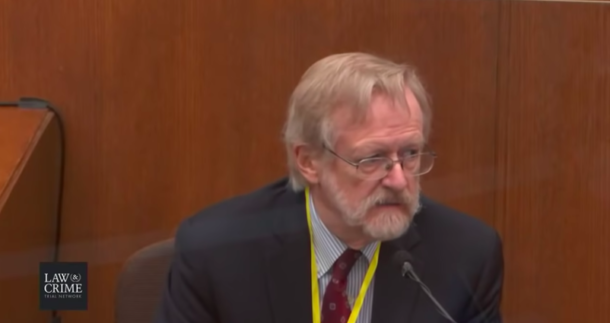
IMAGE: Dr. Martin Tobin for the state. Tobin’s testimony attempted to knock down any doubt that Floyd’s primary cause of death was from low oxygen levels due to Chauvin’s kneeling on him.
The 3rd degree murder charge has been highly contentious. It was added in 2020 when Chauvin was first charged in the death of George Floyd, but Judge Cahill would later dismiss it. It then went through appellate review before getting kicked back to the court. It was subsequently re-instated onto the charges when the state made its opening arguments to the jury. Section (a) of this statute is what the jury must decide on:

IMAGE: Relevant section of 3rd degree murder statute – (a). (Source: State of Minnesota)
This charge could be a real head-scratcher for the jury and they could get deadlocked on it.
To convict Chauvin of 3rd degree murder, the state must convince the jury beyond a reasonable doubt that Chauvin’s acts were “eminently dangerous to others.”
21WIRE has posited all along that the state’s cavalcade of emotive witnesses, most notably the bystander testimony, was mainly intended to create a theory of ‘danger’ lurking outside of the Cup Foods location to try to make the 3rd degree murder charge stick to Chauvin.
Sidebar: Note under section (b) of the statute which has to do with distributing a “controlled substance.”
Jurors are likely to be instructed as to why Morries Hall, Floyd’s other passenger in his vehicle on they day of the incident, did not testify. Hall was seen on security camera footage ‘throwing something away’ at the scene.
Floyd’s ex-girlfriend also testified that Hall was Floyd’s drug dealer. Hall would later invoke his 5th amendment right not to testify. Hall’s attorney was successful in getting the subpoena to testify quashed on the basis that it opened him up to a 3rd degree murder charge for killing Floyd with his drug supply.
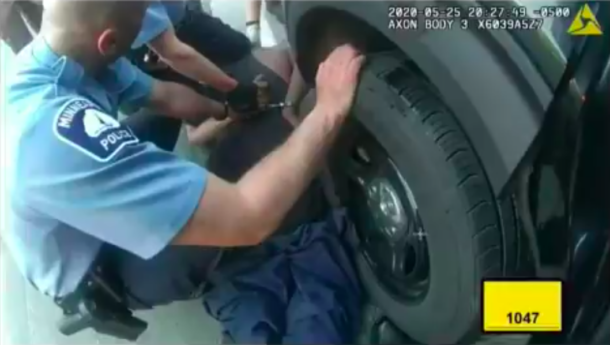
IMAGE: Police body cam footage shown to the jury by the defense in court, depicting Chauvin resting his knee on what appears to be Floyd’s upper shoulder area, not his neck.
The 2nd degree manslaughter charge, of all the charges, appears to most ‘fit like a glove’ for the jury.

IMAGE: Relevant section of 2nd degree manslaughter statute – (1). (Source: State of Minnesota)
All of this, of course, will come down to cause of death for the jury.
Did the state meet its ‘burden of proof’ and prove beyond a reasonable doubt that Chauvin’s actions ‘substantially’ caused Floyd’s death?
The state provided two solid weeks of use-of-force and medical expert testimony to the jury ‐ leading all of its witnesses to conclude that Chauvin restrained Floyd for far too long, and in some cases even outright condemned the type of restraint Chauvin used on Floyd entirely as outside the bounds of what a reasonable police officer would do based on their training.
The state repeatedly played the video footage from every possible angle showing how Floyd ultimately succumbed to Chauvin’s ‘knee on the neck’ and deprived him of the oxygen he needed to stay alive. This was both expected and proved to be the most effective part of the state’s case.
At the same time, through its witnesses, the state also appeared to be telling the jury to disregard Floyd’s perilous health condition at the time of the arrest.
The defense attempted to introduce doubt at every turn ‐ leaning heavily on the medical evidence, interrogating it during cross-examination of Hennepin County Chief Medical Examiner, Dr. Andrew Baker, who performed the autopsy on Floyd and weighed-in on the toxicology report; and later during its own case with the testimony of former Chief Medical Examiner for the State of Maryland, Dr. David Fowler.
Fowler testified that Floyd had died from a “sudden cardiac arrhythmia due to his atherosclerotic and hypertensive heart disease” during his restraint by Chauvin and the other police officers. In addition to this primary cause, Folwer also said that Floyd had other, multiple contributing factors as evidenced from the toxicology report ‐ including the presence of fentanyl, methamphetamines. He also suggested Floyd could have been exposed to carbon monoxide (CO) poisoning from the squad car exhaust.
What to expect from the state’s closing arguments:
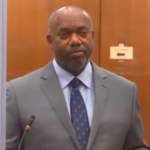
Jerry Blackwell
Attorney Jerry Blackwell will give the state’s closing arguments. Blackwell is the founding partner, CEO and chairman of Blackwell Burke P.A. He is also founder of the Minnesota Association of Black Lawyers. He was not involved in questioning potential jurors and delivered state’s opening arguments.
Blackwell had a few key moments during direct and cross-examination where he successfully threw the occasional legal ‘haymaker’ at the defense through his questioning of witnesses.
Blackwell is expected to make the state’s argument for cause of death ‘positional asphyxia’ and that it substantially caused George Floyd’s death beyond a reasonable doubt.
Blackwell is likely to also play more of the ‘knee on the neck’ video for dramatic effect, and cite unreasonable use-of-force, and other medical testimony as evidence. Jurors have no doubt been through a mind field of medical terminology haystacks during this trial, so also expect Blackwell to conclude on an emotional note as the state asks for a guilty verdict.
What to expect from the defense’s closing arguments:
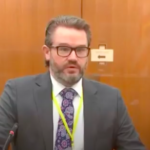
Eric Nelson
Lead defense attorney Eric Nelson will give the defense’s closing arguments. Nelson is managing partner at Halberg Criminal Defense, and also works with a team of attorneys at Minnesota Police and Peace Officers Association – the organization that is funding Chauvin’s defense. He led the jury selection process, delivered opening arguments, and has been the face of Chauvin’s defense from the very beginning.
Nelson spent a consderable amount of time during jury selection getting to know jurors during the voir dire process. If he met any of the jurors under different circumstances, like a ‘cocktail party’, it’s fair to say he would know something about each of them.
Nelson is expected to argue that there’s an abundance of reasonable doubt for the jury to consider with the state’s theory of how George Floyd died on May 25th, 2020.
He’ll lay out for the jury all the contributing factors that caused Floyd’s death, including the cardio-pulmonary events, drug toxicity, possible CO poisoning – not substantially and singularly caused by Chauvin’s restraint.
Another key theme to look out for during Nelson’s closing argument is doubt surrounding whether Chauvin actually had his knee on Floyd’s neck.
Throughout the trial, Nelson appeared to be putting together a ‘If the KNEE doesn’t fit, you must acquit’ argument as multiple witnesses, mainly those brought by the state, testified that not only was Chauvin’s knee not on the neck of Floyd, but there was little to no evidence of injuries to his neck area:
#DerekChauvin’s defense appears to be putting together a ‘If the KNEE doesn’t fit, you must acquit’ argument for closing as multiple witnesses (on both sides) have told the jury there was no evidence of injuries to #GeorgeFloyd’s neck area… #ChauvinTrial pic.twitter.com/Ot9zHWuz3t
— 21st Century Wire (@21stCenturyWire) April 14, 2021
Other doubt Nelson could include in his closing:
- Crowd not in danger and hostile to responding officers
- Police followed arrest protocols, called for EMS at scene
- State’s investigation called into question: ‘slow-walked’ medical examiner’s toxicology report findings
- 2nd squad car search to reveal fentanyl substances
- CO levels in Floyd’s blood not disclosed in evidentiary discovery
- Contradicting state witness testimony on use-of-force training
- Morries Hall did not testify, invoking the 5th with possible murder charge hanging over him
- May 2019 arrest video shows pattern of Floyd’s behavior, including swallowing narcotics and demeanor when confronted by police
- No witness testimony of principal officers involved: Lane, Keung, Thou or Chauvin.
The Verdict
It goes without saying that juries are unpredictable. This jury will have its instructions and the law to follow, but how they apply the instructions and interpret the law as it relates to the evidence in this case is an entirely different thing once deliberation begins.
The 2nd degree manslaughter charge could in fact ‘fit like a glove’ for the jury enough to reach a unanimous decision. The state may have met its burden of proof in the minds of the jury here.
The only chance Nelson may have to overcome this prospect is if he delivers the most persuasive closing statement imaginable, and Blackwell delivers a poor closing statement.
21WIRE has maintained from the beginning of this trial that the state has over-charged Chauvin and murder charges against Chauvin will not stick. The jury is likely to acquit him or be deadlocked on these higher charges.
The punishment phase of this trial, for the American public, will begin shortly after the jury reads its verdict.
Mobs are standing by, at-the-ready, to be stoked in large part by Team Crump’s response to the upcoming verdict. In many ways, the chaos has already begun.
Minneapolis, cities across America – be prepared for more rioting, burning and looting.
***
Visit our LIVE Blog coverage or follow us for trial updates @21stCenturyWire on Twitter. If you like our trial coverage please do consider supporting this independent media platform. Thank you!
READ MORE CHAUVIN TRIAL NEWS AT: 21st Century Wire Chauvin Trial Files
PLEASE HELP SUPPORT OUR INDEPENDENT MEDIA PLATFORM HERE















